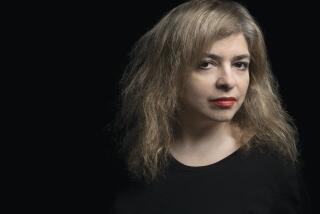Art After Auschwitz
The title of Mary Rakow’s first novel refers to a commonplace of California life. The memory room is a therapist’s office, and Barbara, Rakow’s main character, turns to psychotherapy to cope with what appears to be a nervous breakdown. But to describe “The Memory Room” as a novel of a woman in a midlife crisis fails to capture the lofty ambition and the high achievement embodied in this book.
Barbara may live in the comfort and safety of contemporary Los Angeles, but she is literally haunted by history, both her own intimate history and that of the Holocaust, all of it expressed with rich and daring wordplay--fragments of poetry, flashes of free association, the fugue-like interplay of childhood memories and scenes from concentration camps. None of it, however, conceals the sheer horror of what Barbara endured as a child growing up in deceptively bland Southern California.
At the dark heart of “The Memory Room” is a crime against a young child. A clue is presented to the reader when Barbara’s mother tells her 4-year-old daughter: “I am making you pretty for Daddy.” Not long into the tale that Rakow tells so hauntingly and so harrowingly, the terrible irony in those words is plain--Barbara’s father was not merely a child molester but a child torturer, and Barbara’s mother was his coldhearted accomplice.
The touchstones of Barbara’s inner world--and the weapons she uses to keep her demons at bay--are art, horticulture, music, poetry, psychology and the Bible. Above all, she invokes the work of the poet Paul Celan, a Holocaust survivor who eventually took his own life. It is his poetry, his words and phrases, that comfort her and keep her sane. “He is Boaz,” Barbara says of Celan, invoking the gleaning of the fields that figures so crucially in the Bible’s most poignant love story. “I am Ruth.”
Psychotherapy is not her only or even her most important source of succor. Barbara is a convert from Protestantism to Catholicism, and she craves rituals and relics, martyred saints and the crucified Christ, as she acts out her own Passion play. She is drawn to the baroque setting of the Mission Santa Barbara for a healing service; when she attends a concert at a Methodist church, the spare surroundings strike her as barren:
“I need a real altar.
A place where violence
is performed
and regularly observed.
A place where violence has a
chance to become something
else.”
Barbara is blessed with more than one rescuer, it turns out. Between an elderly neighbor, Josephine, (“Honey,” she tells Barbara, “sometimes you’re just too brainy for your own good”) and a compassionate lover, Daniel, Barbara finds rare moments of ease and comfort and even good humor.
“ ‘Always buy unlined gloves, and always a half-size smaller than your hand,’ Josephine coached when I was going with Daniel to New York. ‘It’s the only way a woman from Los Angeles can look intelligent.’
“Daniel replied, ‘Barbara always looks intelligent, Josephine.’ ” But the ugly secrets always assert themselves, and Barbara is dragged back into the pit of despair that was her childhood. As the memories become ever more vivid, ever more detailed and ever more repulsive, Barbara is reduced to a cry of pain:
“Dies irae
Days of wrath
Dies illa
O day of mourning!”
Rakow is a compelling storyteller, but what distinguishes “The Memory Room” from less accomplished work is its sheer abundance of literary ornamentation and invention. Her prose is sometimes scattered across the page like fragments of verse and the text sometimes shatters into shards--random utterances, stray lines of poetry and echoes of the Psalms, as if to show us the chaos that always threatens to destroy Barbara. “The severed ear listens,” goes one such scrawl, followed by the phrase that Barbara, so needful of both healing and shelter, repeats like a mantra: “Who will bring me into the strong city?” Then, too, Rakow takes a certain moral risk when she allows Barbara, a woman who is shown to putter in her garden and clean out her clothes closet, to conjure up--and identify with--the doomed figure of Celan’s “Deathfugue,” a Jewish woman who spends her last days in the hell-on-Earth of a death camp. “All cruelty is the same,” Barbara says. “Only goodness is singular.” But we might wonder whether the private horror of sexual abuse is equivalent to the vast grotesqueries of the Holocaust.
Rakow acknowledges both her debt to Celan and, at least by implication, the charges that might be laid against her for resorting to his words to describe her character’s pain: “A prisoner in her cell writes a plagiarism on the walls,” Barbara muses at one anguished moment. “A poet’s words instead of her own.” And Rakow’s book reminds us that the observation once made about victims of the Holocaust such as Celan--”The tortured stay tortured”--is surely applicable to a woman who was the victim of sexual torture by her own father.
Significantly, Rakow holds advanced degrees in theology from Harvard University and Boston College: “The Memory Room” is deeply concerned with the issues that are the real stuff of religion, the reasons why we suffer and the things we do to relieve our suffering. Indeed, it is the moral seriousness of Rakow’s book, as much as its literary inventiveness, that elevates her work to the realm of literature: “All art is this,” she writes. “All art is memory.”
More to Read
Sign up for our Book Club newsletter
Get the latest news, events and more from the Los Angeles Times Book Club, and help us get L.A. reading and talking.
You may occasionally receive promotional content from the Los Angeles Times.






